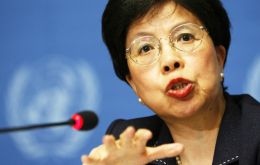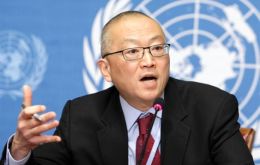MercoPress. South Atlantic News Agency
Tag: World Health Organization (WHO)
-
Monday, May 19th 2014 - 13:54 UTC
People living longer, both in rich and poor countries, says latest WHO report

People everywhere are living longer, according to the World Health Statistics 2014 published this week by the World Health Organization (WHO). Based on global averages, a girl who was born in 2012 can expect to live to around 73 years, and a boy to the age of 68. This is six years longer than the average global life expectancy for a child born in 1990.
-
Saturday, May 17th 2014 - 06:16 UTC
Worldwide 3.3 million deaths in 2012 were caused by harmful use of alcohol

Worldwide, 3.3 million deaths in 2012 were due to harmful use of alcohol, says a new report launched by the World Health Organization (WHO). Alcohol consumption can not only lead to dependence but also increases people’s risk of developing more than 200 diseases including liver cirrhosis and some cancers. In addition, harmful drinking can lead to violence and injuries.
-
Tuesday, May 6th 2014 - 06:41 UTC
WHO declares a polio international public health emergency

The World Health Organization warned Monday that polio has reemerged as a public health emergency, after new cases of the crippling disease began surfacing and spreading across borders from countries like Syria and Pakistan.
-
Sunday, May 4th 2014 - 13:52 UTC
Bacteria antibiotic resistance is winning the day and a major threat to public health

A new report by WHO–its first to look at antimicrobial resistance, including antibiotic resistance, globally–reveals that this serious threat is no longer a prediction for the future, it is happening right now in every region of the world and has the potential to affect anyone, of any age, in any country.
-
Wednesday, March 26th 2014 - 06:09 UTC
Air pollution exposure responsible for 7 million deaths in 2012, says WHO

In new estimates the World Health Organization (WHO) reports that in 2012 around 7 million people died - one in eight of total global deaths – as a result of air pollution exposure. This finding more than doubles previous estimates and confirms that air pollution is now the world’s largest single environmental health risk. Reducing air pollution could save millions of lives.
-
Friday, October 11th 2013 - 18:19 UTC
WHO calls for the phase out of mercury fever-thermometers by 2020

The World Health Organization (WHO) and Health Care without Harm organisation have joined forces to launch a new initiative to get mercury removed from all medical measuring devices by 2020.
-
Tuesday, July 23rd 2013 - 17:22 UTC
Cardiovascular diseases remain number one cause of death, says WHO

Cardiovascular diseases remain the number one cause of death throughout the world, and killed nearly 17 million people in 2011, that is 3 in every 10 deaths. Of these, 7 million people died of ischemic heart disease and 6.2 million from stroke, reports the World Health Organization.
-
Thursday, July 11th 2013 - 06:58 UTC
One third of world’s population benefits from effective tobacco control measure

At 2.3 billion, the number of people worldwide covered by at least one life-saving measure to limit tobacco use has more than doubled in the last five years, according to the WHO Report on the Global Tobacco Epidemic 2013. The number of people covered by bans on tobacco advertising, promotion and sponsorship, the focus of this year’s report, increased by almost 400 million people residing mainly in low- and middle-income countries.
-
Monday, July 8th 2013 - 23:57 UTC
FAO and WHO agree on new Alimentarius Codex with stricter standards for healthier diets

The UN food standards body Codex Alimentarius has agreed on new standards to protect the health of consumers worldwide. These include standards on fruit, vegetables, fish and fishery products and animal feed.
-
Saturday, July 6th 2013 - 07:01 UTC
H1N1 influenza virus outbreak in north Chile; government considering decreeing ‘health alert’

Eleven people have died from the H1N1 influenza virus in northern Chile in an outbreak that the health minister raised the possibility of decreeing a health alert to restrict people's mobility.
